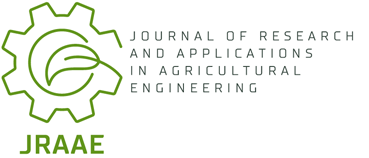Current issue
Online First
Archive
Instructions for Authors
Guide for Authors
Peer Review Policy
Research Ethics Policy
Crossmark Policy
Ghostwriting and Guest Authorship
Copyright
Open Access Policy
Plagiarism
About the Journal
Aim and Scope
Scientific Board
Publisher
Editorial Board
Indexing in Databases
Personal Data Protection
Repository Policy
Contact
ORIGINAL PAPER
Assessment of the efficiency of information technologies use in fruit-growing farms
1
Uniwersytet Rolniczy im. Hugona Kołłątaja w Krakowie, Wydział Rolniczo-Ekonomiczny, Katedra Chemii Rolnej i Środowiskowej, al. Mickiewicza 21, 31-120 Kraków, Poland
Journal of Research and Applications in Agricultural Engineering 2016;61(2):70-73
KEYWORDS
ABSTRACT
The aim of the conducted study was to evaluate to what extent information technologies are used by farmers engaged in fruit-growing production with respect to implementing and maintaining a production system that is compliant with the GLOBAL G.A.P. standards. The study covered 71 farms associated in five producer groups. The study was conducted in Łódzkie and Mazowieckie provinces. Commercial farms were used in the study; those farms use the latest technologies and means in production, and they achieve high yields. In order to reach the established aim of the study, a survey was conducted. Based on the survey, it was estimated to what extent those farms use information technologies when designing the production system and implementing the GLOBAL G.A.P. system. Most of the studied farmers do not see the benefits of implementing quality systems in primary production. Based on the conducted study it was found that information on the principles of quality systems as well as information concerning plant protection are usually searched for on the Internet, whereas trade journals are the most trusted by the surveyed farmers as regards information on new technologies. When it comes to fertilization, the studied farmers use information technologies to a very small extent. All the respondents claim that development of new production technologies is conditioned by the access to a quick and accurate source of information.
REFERENCES (18)
1.
Behera B.S., Panda B., Behera R.A., Nayak N., Behera A.C., Jena S.: Information Communication Technology Promoting Retail Marketing in Agriculture Sector in India as a Study. Procedia Computer Science, 2015, Vol. 48, 652-659.
2.
Cole D.C., Levin C., Loechl C., Thiele G., Grant F, Girard A.W., Sindi K., Low J.: Planning an integrated agriculture and health program and designing its evaluation: Experience from Western Kenya. Eval. and Program Plann., 2016, Vol. 56, 11-22.
3.
Craheix D., Angevin F., Doré T.: de Tourdonnet S.: Using a multicriteria assessment model to evaluate the sustainability of conservation agriculture at the cropping system level in France. Europ. J. of Agron., 2016, Vol. 76, 75-86.
4.
Cupiał M., Szeląg-Sikora A., Niemiec M.: Dobór dawki nawozów mineralnych w gospodarstwie przy wykorzystaniu programu Nawozy-2. Proceedings of ECOpole, 2015, Vol. 9(1), 179-184.
5.
Danis T.G., Karagiozoglou D.T., Tsakiris I.N., Alegakis A.K., Tsatsakis A.M.: Evaluation of pesticides residues in Greek peaches during 2002-2007 after the implementation of integrated crop management. Food Chem., 2011, Vol. 126(1), 97-103.
6.
Deike S., Pallutt B., Christen O.: Investigations on the energy efficiency of organic and integrated farming with specific emphasis on pesticide use intensity. Europ. J. Agron., 2008, Vol. 28, 461-470.
7.
Dyrektywa Parlamentu Europejskiego i Rady z dnia 21 października 2009 r. 2009/128/WE ustanawiająca ramy wspólnotowego działania na rzecz zrównoważonego stosowania pestycydów.
8.
Jurasie R, Sanjuán N.: Life cycle toxicity assessment of pesticides used in integrated and organic production of oranges in the Comunidad Valenciana, Spain. Chemosphere, 2011, Vol. 82(7), 956-962.
9.
Kersting S., Wollni M.: New institutional arrangements and standard adoption: Evidence from small-scale fruit and vegetable farmers in Thailand. Food Policy, 2012, Vol. 4, 452-462.
10.
Morris C., Winter M.: Integrated farming systems: the third way for European agriculture? Land Use Policy, 1999, Vol. 16, 193-205.
11.
Mzoughi N.: Farmers adoption of integrated crop protection and organic farming: Do moral and social concerns matter? Ecol. Econ., 2011, Vol. 70, 1536-1545.
12.
Niemiec M.: Efficiency of slow-acting fertilizer in the integrated cultivation of Chinese cabbage. Ecol. Chem. Eng. A, 2014, Vol. 21(3), 333-346.
13.
Papadopoulos S., Markopoulos T.:. Factors Affecting the Implementation of Integrated Agriculture in Greece. Procedia Economics and Finance, 2015, 33, 269-276.
14.
Perdikis D., Fantinou A., Lykouressis D.: Enhancing pest control in annual crops by conservation of predatory Heteroptera. Biol. Control, 2011, Vol. 59(1), 13-21.
15.
Pypers P., Sanginga J-M., Kasereka B., Walangululu M., Vanlauwe B.: Increased productivity through integrated soil fertility management in cassava-legume intercropping systems in the highlands of Sud-Kivu, DR Congo. Field Crop. Res., 2011, Vol. 120(1), 76-85.
16.
Shahpoury P., Hageman KJ, Matthaei CD, Francis S, Magbanua FS.: Chlorinated pesticides in stream sediments from organic, integrated and conventional farms. Environ. Pollut., 2013, Vol. 181, 219-225.
17.
Shukla K.K., Patel D.J., Radadiya B.L.: Role of Information Technology in Improvement of Current Scenario in Agriculture. Oriental Journal of Computer Science and Technology, 2014, Vol. 7(3), 390-395.
18.
Tuomisto H.L., Hodge I.D., Riordan P., Macdonald D.W.: Exploring a safe operating approach to weighting in life cycle impact assessment e a case study of organic, conventional and integrated farming systems. J. of Clean. Prod., 2012, Vol. 37, 147-153.
We process personal data collected when visiting the website. The function of obtaining information about users and their behavior is carried out by voluntarily entered information in forms and saving cookies in end devices. Data, including cookies, are used to provide services, improve the user experience and to analyze the traffic in accordance with the Privacy policy. Data are also collected and processed by Google Analytics tool (more).
You can change cookies settings in your browser. Restricted use of cookies in the browser configuration may affect some functionalities of the website.
You can change cookies settings in your browser. Restricted use of cookies in the browser configuration may affect some functionalities of the website.


